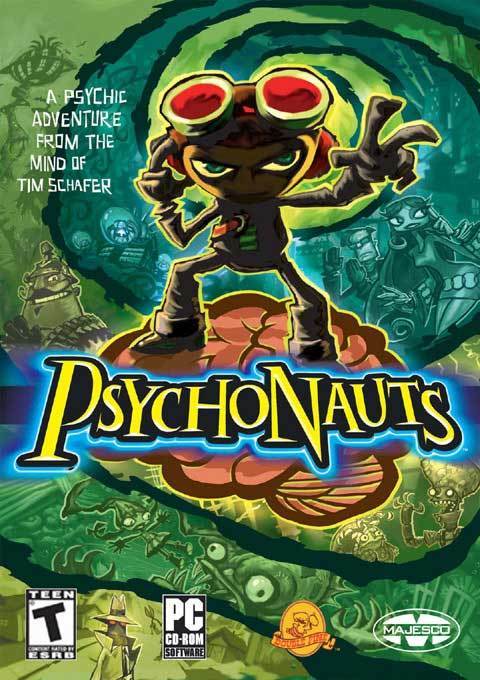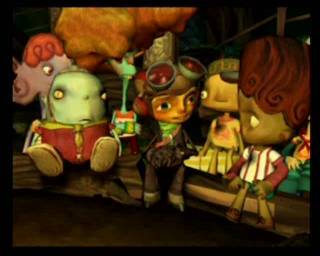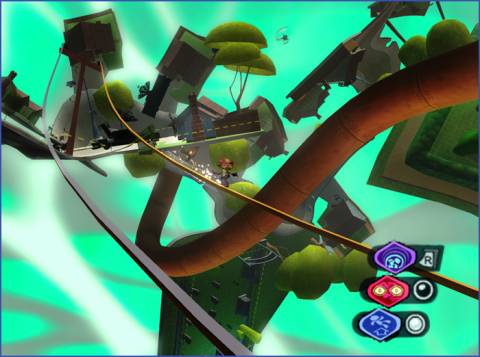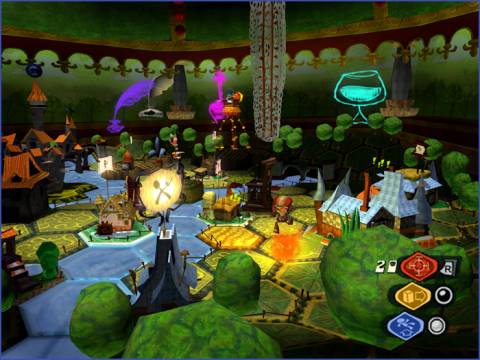As Good As It Got: Psychonauts
By meatsounds 1 Comments
As Good As It Got is a blog series I post whenever the fancy strikes me, revisiting some of my favourite moments in video gaming history. While I don't try to address the question of whether video games are art (something I suspect we'll only be able to settle in retrospect some time in the future - the scene is still developing very quickly and its hard to know where it will go), I do cast a critical eye on the status the games in question are supposed to have as aesthetic experiences. The line I push is that there is some really interesting things happening on the level of art and aesthetics in some video games, even at the best the history of video games is a series of qualified successes.

Psychonauts was Double Fine's first release, and Tim Schafer's first project after leaving LucasArts when they closed their adventure game division. His swan song for LucasArts was Grim Fandango, a masterpiece and perhaps my favourite game, but which garnered unremarkable sales. LucasArts saw its investment in the genre starting to give harshly diminishing returns, and decided to get out of the game. The experience probably left a mark on Schafer, who hasn't made an adventure game since despite having made nothing else before. Psychonauts is a 3D puzzle platformer, complete with an explorable hub world, hidden areas and collectibles. The gameplay is rather conventional, on the gentle end of the platform experience with not-too-menacing opponents peppering rather-quite-benign environments closed off by altogether-non-fiendish puzzles. The player-character gets by through running and jumping and a steadily-increasing range of psychic powers. They aren't terribly original or special either, covering the usual range of attacking, defensive and movement powers. While you're expected to occasionally use these powers in somewhat creative ways to the end of solving some puzzle, the real focus in Psychonauts certainly isn't on its gameplay mechanics.
No, the real focus here is on the setting. Psychonauts takes place in a summer camp for psychics, a way for talented children to eventually join the corps of psychic agents who run the camp and act as its instructors. The protagonist, Razputin, runs away from home and gatecrashes said summer camp in the hope of receiving the same training and himself becoming a psychonaut. The camp and its environs are a mix of the mundane and the extraordinary: the children who stand around are doing the things bored children do, but while levitating and setting things on fire with their mind. The wild animals that come out at night are not just cougars and bears, but a bear that uses telekinesis to hold you in place as it lumbers over the slap you in the face, while the cougars that ambush you with pyrotechnics. The same old man shows up covering all the various tasks needed to maintain the camp (groundsman, janitor, ranger, cook, lifeguard, and, it quickly transpires, head of the agency) but with a different persona each time in a particularly schizoid version of the Everyman. This same well-realised atmosphere carries over to the later stages of the game, exploring the abandoned mental asylum, which is crumbling at improbable angles and is home to a series of long-neglected weirdos. All of this is happening just in the hub world, and it helps to set the tone for the experience: friendly, quirky and charismatic.

It's possible the characters have received even more love and attention than the environment they inhabit. Each of the children at the camp, of whom there are well over a dozen, have clear and distinct personalities, with cliques, crushes (unrequited and unrealised alike), and visible but never-discussed issues in the way kids have -- in short, well-rounded psychologies, not just involving how they see and communicate themselves, but also in how they relate to other characters. The level of detail and thought invested in even the most inconsequential character lends a real weight to what they do and the world they inhabit. This is the type of feature which made Jane Austen such a great novelist, and here it is in a video game, available from a button prompt.
To put it simply, this is an astonishing thing to see, especially since this has no effect whatsoever on the gameplay. None of the other children play any role at all in the moment-to-moment running of the game (there's the girl Raz gets a crush on, but she's more of a feature of the cutscenes than of the gameplay). At most it can give the game character, but no matter how much character a game might have, it still needs to be a game. Here I think we come to an issue which helps hide the artistry in games: their best qualities are often things which would seem to work as well or better in other mediums (especially film, from where games obviously take most of their cues). Psychonauts however gives us as clear idea of how video games might make use of their distinct qualities to make a case of their own. What games uniquely offer is a solid way to interact with the setting. A movie could deliver the same characters with the same lines of dialogue. But in Psychonauts, when you climb to the top of the store to see the two unhappy children despondently contemplating the world, you know how far they've gone to be alone, because you've gone that far as well. It is painfully clear that you are intruding. Not only does this communicate on its own, but when the children absently talk to you in a way easily decoded as waiting for you to leave so they can say what they really want to, their tangible isolation helps to make their intention clearer. This isn't a feature you're likely to see on the back of a box, but we need to pay attention, because this is someone making use of the unique features of video games in order to do something you can't do any other way.

This obvious care and thoughtfulness is of course apparent in the major actors and environments as well: when you enter the playing levels proper (projections inside the minds of those around the camp) you can see their filled-out personalities on display, poke at it, and be amazed at what you discover. This could have had a tedious inevitability, just as films and books often do (whenever you turn to page 72, the hero's deepest fears are there in back and white), but the interactivity of the game means that it feels more like a genuine process of discovery. Given that Psychonauts's central conceit is that Raz enters the minds of the a range of characters in order to piece together the story arc, this process of scratching the surface is what keeps the game moving. Once you move towards the asylum, the minds of those you encounter are warped in astonishing ways, reminding you that psychoses are the inspiration for grandiose and pathetic visions. Setting aside to what degree Psychonauts is intended to be an investigation of the depths of human fantasies (probably no more than the movie Fantasia is), this offers some astonishing and deeply memorable environments to run around. It helps that the art direction is excellent throughout: the levels are not only well-conceived, but are rounded out with confident expertise and a series of masterful touches. If you haven't played the game, you really should: there's been nothing like these levels before or since. Also, like all Tim Schafer games, Psychonauts is very, very funny. The writing is best in class, and the vocal performances are excellent.

The game unfortunately has its flaws. The gameplay, as I mentioned, isn't very original: it is, in fact, quite uninspiring. The two weakest parts are the two levels which are there for gameplay's sake: the tutorial and the finale, the latter of which has a sudden jump in difficulty which throws many players off and serves no ultimate purpose. Double Fine seems to have discovered a way to make gameplay be an excellent aid to the storytelling, but not to be interesting in its own right. I suspect the game would have been better served by not ever making the player's skill be the focus, and instead simply kept itself at the very gentle pace it had set throughout. It would then have been a very easy game (it still isn't really challenging at all), but I don't keep going back to Psychonauts for the thrills of nailing pixel-perfect jumps. The only problem here is that moment-to-moment gameplay never goes away, and the game keeps you at it for ten hours or more (if you play with the same explorer's spirit as it eagerly encourages you to). That's a lot of hours of ho-hum gameplay. This is an issue I don't think Double Fine, or anybody for that matter, has really mastered, with Double Fine games still not setting anybody's thumbs ablaze, whereas elsewhere the pendulum has swung the other way to sequences scripted as tightly as any movie. But Psychonauts deserves you attention and admiration: it is as good as it got.

1 Comments